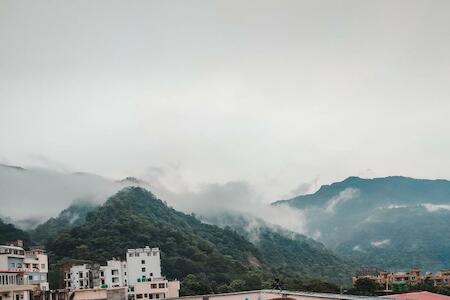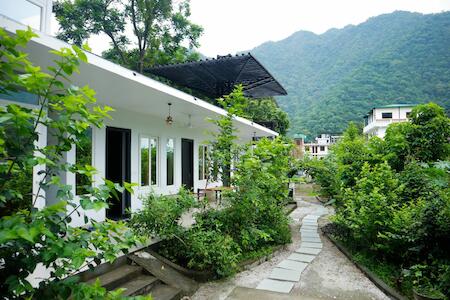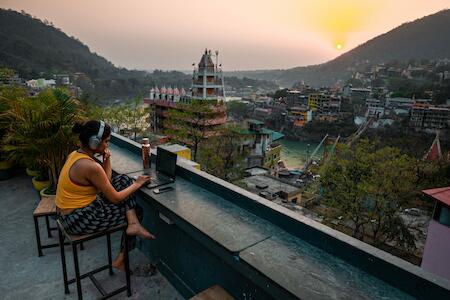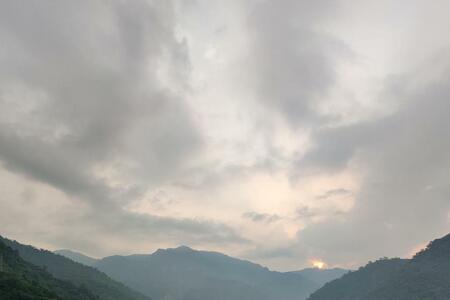Looking for budget stays in Rishikesh? This section is designed to save you time, money, and unnecessary stress. We've got insider tips to help you find affordable hostels and the cheapest places to stay in Rishikesh.
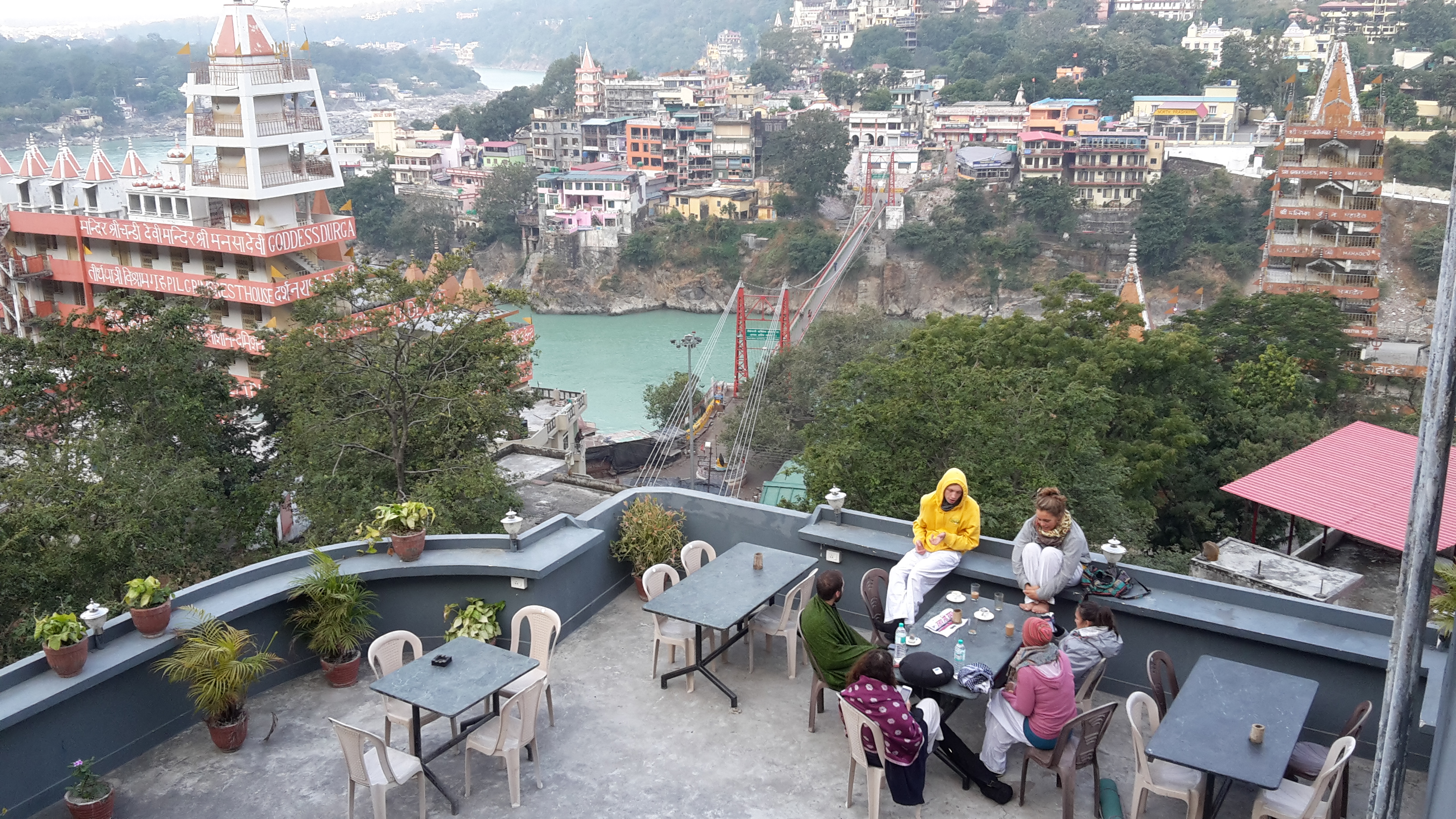
Rishikesh, located in the idyllic foothills of the Himalayas of Uttarakhand, is also known as the yoga capital of the world. It’s considered one of the holy cities in Hinduism as it is where the holy river Ganges flows out of the Himalayas onto the alluvial plain of northern India.
Take a bath in the Ganges where it is still clean and unpolluted, hike in the surrounding hills, go whitewater rafting or enjoy a yoga session while in Rishikesh. There is even an opportunity to try bungee jumping!
Rishikesh is an hour north from Haridwar, which can be reached by rail from Delhi. There are also buses connecting Rishikesh to various other cities in India. More about that below.
Be aware: Rishikesh is a holy city so meat, fish, eggs and alcohol are prohibited. These items will neither be served in any of the restaurants nor sold in any of the shops. Do the right thing and choose not to smuggle these items in when arriving from other parts of India.
There’s lots to cover to help you prepare for an awesome trip to Rishikesh. We cover:
- Getting to Rishikesh
- Which area(s) to stay in Rishikesh
- Ashrams vs Hostels
- All things Yoga
- Fun things to do in Rishikesh
- Useful and Important Info
- Day Trips from Rishikesh
- Is Rishikesh for you?
- Safety Tips
Many travellers do not realise just how big Rishikesh is. Rather than stay in the main city area, we recommend choosing an accommodation between the Ram Jhula and Lakshman Jhula Bridges - 10km from the centre and the main backpackers area and the most famous part.
Here is a handy map with the main backpacking area highlighted. All other useful places mentioned in this section are also pintpointed.
(open the full map version here)
Getting to Rishikesh
First and foremost, let’s look at your options for getting to Rishikesh safely. As it is a top tourist destination, there is no shortage of transport choices, depending on your preferred method.
Flights
The nearest airport to Rishikesh is in Dehradun, just 35 km down the road. The airport is called Jolly Grant and only national flights operate from here.
There are daily flights from Delhi which take around one hour. From Dehradun, local buses frequently head to Rishikesh and take around 2 hours.
By Bus
Travelling around India by bus is a common choice as it’s super cheap and there are regular buses leaving, especially between the larger cities.
The most common bus route is from New Delhi to Rishikesh - a 9 hour journey.
From Kashmere Gate IBST in New Delhi, buses depart for Rishikesh every morning and late evening each day.
A great bus ticket booking service is redBus. There are also many transport booking shops in India. Just do your research beforehand and get an idea of what a ticket should cost to avoid being overcharged.
By Train
The nearest train station is in Haridwar, around 25 km away. In turn, Haridwar is connected to larger cities such as New Delhi, Varanasi, Lucklow and Mumbai.
Our advice: get the train to Haridwar and then change to a bus which will take around 30 minutes to Rishikesh.
Popular train services include Shatabadi Express, Jan Shatabdi, AC Special Express and Mussoorie Express.
MakeMyTrip and IRCTC are options for booking tickets. Local transport booking shops are also an option.
Which areas(s) to stay in Rishikesh
Let’s be clear: the main backpacker and tourist area of Rishikesh is between Ram Jhula and Lakshman Jhula bridges. Anywhere outside of this area is very local and pretty overwhelming, especially if you haven’t been in India for very long.
So, we recommend every traveller type to stay in this area to make the best of what Rishikesh has to offer.
It doesn’t matter too much which side of the river you stay on as the entire area is easily accessible by foot. Just we aware that the most popular area is Laxman Jhula, so if you decide to stay across the river in Tapovan, you will have to cross the bridge each time. This is often a slow, overcrowded and arduous crossing, so bare that in mind.
Within the parameters of these bridges you will find ashrams, good food, hostels and yoga teacher training places.
Toward the Beatles Ashram is also a good option. It’s quieter up this way, though there is less access to restaurants.
Here is an overview of your options of areas to stay:
* Between Beatles Ashram and Ram Jhula - Quieter, local vibe, many cheap ashrams (no hostels)
* Between Ram Jhula bridge and Laxman Jhula bridge - Busy, access to great food, few hostels
* Tapovan (north side of Ganga river) - Plenty of hostels, cafes, many more locals
Ashram vs Hostels
So, you’re aware that ashrams are popular in India. Let us break down the differences between ashrams and hostels in Rishikesh, including their pros and cons.
If you’re staying in the area for some time, we recommended splitting your time between both.
Stay in an Ashram
Many people who visit Rishikesh do so for spiritual reasons. Often, they decide to stay in an ashram, a place where one can stay to reflect and practice yoga and meditation.
Ashrams abound in the city of Rishikesh. They are open to anyone, whether for spiritual reasons, to retreat from busy modern life, or just out of plain interest in experiencing life in an ashram.
Though anyone is welcome to stay in an ashram, it is expected to respect the silence and serenity of the place. Alcohol and meat are not allowed.
Have a look at the map for the most well-known Ashrams in the area that you might consider. These include:
- Parmarth Niketan Ashram
- Gita Bhawan
- The Beatles Ashram (aka Maharishi Mahesh Yogi Ashram)
- Baba Kali Kamli Vanprasth Ashram
- Sivananda Ashram
* Pros: Free meditation & yoga sessions, super cheap, long stay available, Indian food (often) included.
* Cons: Very basic, dirty (no daily cleaning), curfew, strict rules, often full, no Wifi or A/C.
Stay in a Hostel
For those who don’t like the idea of waking up at 4 am to meditate, there is a range of hostels available.
Hostels are mainly located between the Ram Jhula and Lakshman Jhula bridges, northeast of the center, near the river Ganga. Many hostels in Rishikesh offer free yoga lessons as well.
Top tip: Always check the location of your chosen hostel before booking.
Overall, hostels in Rishikesh are highly sociable, clean and modern. Of course, some are better than others so do your research.
* Pros: Social (events), modern amenities, knowledgeable & helpful staff, great locations, privacy curtains.
* Cons: Free breakfast isn’t ‘a thing’ in Rishikesh, taxes not always included.
All things Yoga
Rishikesh is also known as Tapo Bhumi which means “place for Yoga and Meditation of the Gods”.
It’s both the birthplace of yoga and the yoga capital of India. Whether you’re already a yoga freak or keen to get started, this is the perfect place for you.
Yoga opportunities are everywhere you look!
- Join free yoga classes at your hostel/ashram
- Sign up for 200/500hr Yoga Teacher Training
- Attend a local academy for weekly sessions
There are many, many academies in Rishikesh offering the 200hr Yoga Teacher Training.
Use Book Yoga Retreats as a useful comparison site.
Definitely worth checking out is the International Yoga Festival which takes place each year, usually in March.
Fun Things to do in Rishikesh
Never fear; there are more fun things to do in Rishikesh other than yoga and visiting an ashram.
Is it worth visiting Rishikesh if you’re not into yoga? Absolutely! Let us give you a few other reasons to visit:
1. Bungee Jumping - Jumpin Heights is the only place to try this. It’s run by ex-army officers and is incredibly safe. It’s the highest bungee in India at 83 metres!
2. Beatles Ashram - Rishikesh is the place where the Beatles got inspired by Indian culture to write many of their later songs. The ashram where the famous group stayed can still be visited, though in a state of deterioration.
3. River rafting - Fancy water rafting down none other than the river Ganges? There are few different companies offering this in the city.
4. Triveni Ghat - Most famous and biggest Ghat in Rishikesh. A wonderful place to observe devotees taking a ritual bath to cleanse their sins.
5. Neer Garh Waterfall - A gorgeous hike. The waterfall is around 1.5 miles from Laxman Jhula bridge.
6. Rajaji National Park - halfway between Rishikesh and Haridwar
Adventure activities are huge in Rishikesh. Try out cliff jumping, rock climbing and kayaking. Cafe hopping Rishikesh is also a popular activity and a great way to escape the crowds and wind down.
All of the Rishikesh things to do are highlighted on the map.
Useful and Important Info
Here is some useful and important information you need to know before visiting Rishikesh.
It’s always a good idea to be well-prepared for destinations such as India, especially because the culture is so different from most other places in the world.
Currency: Indian Rupee (sign: ₹; currency code: INR).
Best time to visit: Early March to early May. June is very hot, reaching 35 degrees. The best time for river rafting is late September to mid November.
How long to stay: Minimal of 3 days, up to 6 weeks (for yoga training).
Getting around: Walk! Everything is accessible by foot. You have to walk across the bridges. Rickshaws are useful for visiting nearby areas. Expect to pay around ₹15/km.
Tax: For some hostels you can expect to pay 1000-2499 INR, 12% tax; 2500-7499 INR, 18% tax; over 7500 INR, 28% tax. Always check this before booking.
Cows & Monkeys & Mopeds, Oh my! Something to be aware of is the amount of wildlife and animals wandering the streets of Rishikesh. Keep an eye out for monkeys - they are not shy and will run by and steal your fruit if you’re not careful. Cows are sacred and spend much of their time in the same areas as humans. Bulls can be aggressive so don’t get too close. And mopeds? They are everywhere and you’ll be forever dodging them.
Curfew: A typical curfew when staying at an ashram is 10pm. They have large lockable gates, so make sure you’re back in time!
Day trips from Rishikesh
If you’re planning on staying in Rishikesh for some time, you might fancy exploring the immediate area.
Destinations that are close-by and worth visiting include Haridwar, Chamba and Dehradun.
Haridwar is definitely worth visiting in the evening. Har Ki Pauri hosts a nightly Ganga Aarti (river-worshipping ceremony) where thousands of people gather to float little flickering lamps off the steps, swim and gather Ganga water. 40 minutes from Rishikesh.
Chamba, also known as Land of Lord Shiva, is the place to head if you like trekking. It’s 12 hours from Rishikesh so 1-2 nights is advised. It’s right in the very north of the country and is a wilder part of India.
Dehradun is the capital of Uttarakhand. It’s a great place for religious attractions, wildlife havens and as a stop off on route to bigger cities. 1 hour from Rishikesh.
What Traveler-types visit Rishikesh?
Due to the chaotic and adventurous nature of Rishikesh, we recommend this destination for solo travellers (including female solo travellers), backpackers, couples and friends.
Families may not enjoy the sociable nature of hostels and some of them do not accept children.
Safety in Rishikesh
Is it safe in Rishikesh? The main answer to this is yes.
HOWEVER! Like with all other tourist destinations in the world, you still need to have your wits about you and be careful.
Common sense precautions include:
1. Keeping your belongings on your person
2. Put your valuables in a hostel locker
3. Don’t carry around a high amount of money
4. Don’t hand over your phone to a stranger to take a ‘selfie’
5. Don’t walk on your own after dark
Scams
Ah India, a hotbed for scammers. If there has to be a dark side to Rishikesh, it would be the potential scams.
Yet that doesn’t mean it’s going to happen to you, or that you need to be fearful of everyone that approaches you!
To help you prepare, here is a list of the common scams in India. As they target backpackers and young people, it’s possible that you may come across them in Rishikesh.
1. Hostel is closed down: your driver tells you your hostel is closed and will take you to his friends/families hotel instead. Your hostel isn’t really closed and he gains commission. Don’t fall for it! Double check online that your hostel is open.
2. Currency switcharoo: A vendor will drop a few notes you’ve handed over and ask you to make up the difference. They are very quick and practised in this. Count out your money as you hand it over. Also be wary of them swapping large notes for smaller ones.
3. Unofficial SIM card: It’s difficult to find official sources for this kind of purchase. Unofficial sellers will often hand out dufunkt or almost expired SIM cards. Make sure you buy directly from Vodafone or Bharti Airtel. Better still, sort out your international SIM before arriving in India.
4. Milk beggars: Women will often rent babies or use their own to beg for milk powder. It’s a heart-breaking thought that there is a hungry baby and desperate mother, yet this is a common scam in India. They want you to go to a store and buy at an extorted price, only to return (once you’ve left) to receive the difference in cash.
5. Duty free gemstone import: A friendly stranger will ask you to be a part of ‘legally’ importing gemstones, using your duty free allowance, to your home country. They offer to pay for flights and a hefty sum of money upon completion. Something happens with (fake) customs and you’re asked to pay money upfront to avoid charges. Kindly refuse to take part in any sort of request like this.
Delhi Belly
Food poisoning and an upset stomach is highly likely if you’re not accustomed to India. To be honest, you’re likely to get sick at least once even if you are.
Sanitation and general health and safety isn’t a big priority in India. The food laws aren’t as strict as in the West.
Tips to help keep you off the toilet are:
1. Avoid salads as much as possible (usually washed in unsafe water)
2. Order food from your hostel and/or cook in the common kitchen
3. Be more vigilant with hand washing
4. Only drink bottled or filtered water
5. Eat at western-style restaurants
Luckily for you, Rishikesh is full of western restaurants following western food standards.
Some great places to be aware of are pinpointed on the map. This includes a German bakery and a health-focused restaurant serving up avocado and smoothies.
Cultural Differences
Something to be aware of is that you’re likely to attract attention, especially if you are white with fair hair. This is not necessarily a safety issue, but it can be distressing if you’re not used to it or do not particularly like to be in the limelight.
Locals love their mobile phones, and will often request travellers to take a selfie with them, their families and children. It can sometimes cause a domino effect and can have you keeping up a smile for the whole neighborhood.
It’s fun and a great way to meet locals. Yet, learn how to say no and don’t be afraid to use it.
Written by Travel Expert Rishikesh
 Kelly
Kelly

